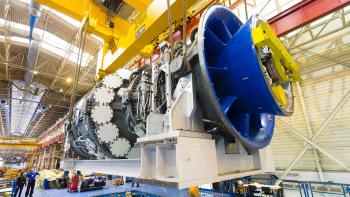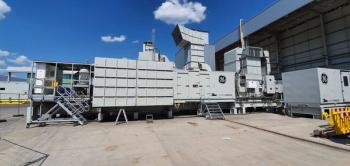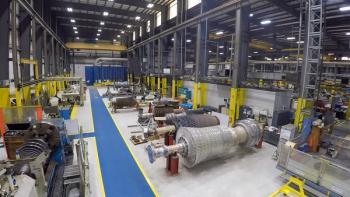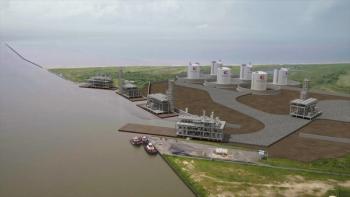
- November/December 2023
- Volume 64
- Issue 7
Q&A: Air Compressors with FS-Elliott
FS-Elliott's Dominic Sarachine discusses the company's takeaways from TPS 2023 and offers insights into air compressors and centrifugal compressor control systems.
Integrally geared centrifugal air compressors offer oil-free air by maintaining complete segregation of the air path and the lubrication system. These compressors use air seals to prevent any oil from entering the compressor air path. Because oil is never introduced into the air path, there is no need for additional filtration systems downstream of the compressor to remove oil from the air stream. In contrast to some other technologies, centrifugal compressors also have fewer contacting parts that will wear, resulting in lower maintenance costs and a longer service life.
To gain more insights into the air compressor industry, Turbomachinery International sat down with Dominic Sarachine, Product Manager at FS-Elliott, during Turbomachinery & Pump Symposia 2023. Sarachine dove into the pros and cons of air compressors, the role they play in power plants, and control systems for compressors' evolution toward smart machine concepts. Additionally, FS-Elliot shared its top takeaways from this year’s show.
Q: What were your top two takeaways from TPS 2023?
Sarachine: I was impressed by how busy and active the exhibitor floor was throughout the entire show. There was a constant stream of suppliers, contractors, operators, students, and many others at our booth this year. This level of participation points toward a continued resurgence in turbomachinery since 2020/2021. There is a renewed focus on diversifying supply chains and reshoring manufacturing to allow for better and more predictable equipment deliveries.
Additionally, this year's show focused heavily on reliability and efficiency, both in the lectures and by exhibitors. Through advancements in instrumentation and controls, operators can increase the reliability of their machines through more predictive indicators. These indicators allow them to be proactive in performing maintenance on equipment and eliminate unplanned downtime.
Similarly, efficiency has become even more important as operators look to reduce energy costs and carbon emissions as a result of equipment operation.
Q: What is the role of a centrifugal air compressor versus a lube-oil compressor in a power plant?
Sarachine: Centrifugal air compressors can be used in several applications at a power plant but are most commonly used to provide instrument air. Compressed air is often needed to operate pneumatic instrumentation and control devices, making it critical to plant operation. Compressed air is often referred to as the "fourth utility" after electricity, water, and gas. While many may not think of compressed air when considering the utilities required for plant operation, operators understand that compressor air is just as critical to the continuous operation of the plant as the other three utilities.
A lube-oil compressor, on the other hand, is designed to lubricate large rotating equipment in a power plant, such as turbines or reciprocating engines. The primary purpose of a lube-oil compressor is to provide pressurized lubricating oil to ensure the proper lubrication and cooling of various components within the machinery it serves.
Q: What advantages and challenges do air compressors present?
Sarachine: There are several types of technologies used to compress air, and each of them comes with different advantages and challenges. Generally speaking, some of the major advantages of air compressors are their versatility, efficiency, environmental impact, and low maintenance requirements. Air compressors also do not produce greenhouse gases or emissions when operated.
Conversely, air compressors come with a set of common challenges, including initial investment expenses, ongoing energy consumption costs, space requirements, and noise concerns. The upfront costs of air compressors can vary considerably based on the chosen technology and scope of application. However, it's important to note that the most substantial expenditure following the initial capital investment revolves around the energy expenses required to keep the machine running smoothly.
Centrifugal air compressors are specifically designed to have a low cost of ownership as compared to rotary screw compressors or reciprocating compressors. This is due to their overall efficiency and low maintenance requirements; however, the upfront capital costs are typically higher for a centrifugal air compressor.
Q: What trends or innovations does FS-Elliott see in remote monitoring/control systems for compressors?
Sarachine: Centrifugal compressor control systems continue to evolve toward smart machine concepts that ensure efficient and reliable operation at all times. Key developments that support smart machine operations include the continued development of energy monitoring systems, predictive maintenance systems, and data analytics through remote monitoring. Coupling these systems together not only helps to reduce a user's carbon footprint through CO2 emission reductions but can allow for OEM troubleshooting without the lost time and cost of a site visit.
Articles in this issue
almost 2 years ago
Turbo Tips: Lube Oil Types & Selection for Turbomachinesabout 2 years ago
The Immersive Worlds of AR & VR in the Turbomachinery Industryabout 2 years ago
New Products: Fall 2023about 2 years ago
Turbomachinery International: November/December 2023Newsletter
Power your knowledge with the latest in turbine technology, engineering advances, and energy solutions—subscribe to Turbomachinery International today.




